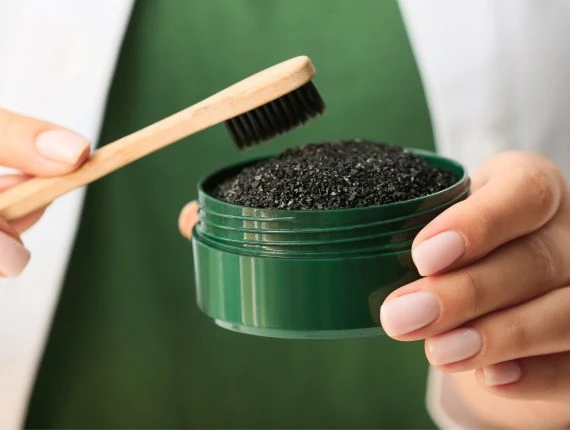Natural Teeth Whitening: Myths and Reality

Natural Teeth Whitening: Myths and Reality
Natural teeth whitening has gained popularity over the years, as people search for cost-effective and less harmful alternatives to traditional teeth whitening methods. However, it is essential to differentiate between myths and reality when considering natural teeth whitening options.
One common myth is that brushing with activated charcoal or baking soda can whiten teeth. While these substances have mild abrasive properties that can remove surface stains, they can also damage the tooth enamel if used frequently or improperly. Moreover, they do not change the intrinsic color of the teeth, which is the primary cause of yellowing.
Another popular belief is that consuming certain fruits, such as strawberries and lemons, can brighten teeth. While these fruits contain acids and enzymes that may remove surface stains, they can also erode tooth enamel over time, leading to increased sensitivity and cavities.
Oil pulling, an ancient Ayurvedic technique, is another natural teeth whitening method that has gained attention. By swishing oil in the mouth for an extended period, it supposedly removes bacteria and toxins that cause stains. However, scientific evidence supporting the effectiveness of oil pulling for teeth whitening is limited.
In reality, the best approach to maintaining a healthy, white smile is through regular dental check-ups, proper oral hygiene, and reducing the consumption of stain-causing foods and beverages. If you are interested in whitening your teeth, it is recommended to consult a dental professional to discuss the most suitable and safe options.
Oil pulling: What is it and does it work for teeth whitening?
Oil pulling is an ancient Ayurvedic dental technique that involves swishing a tablespoon of oil (typically coconut, sesame, or sunflower oil) in your mouth for about 15 to 20 minutes on an empty stomach. This practice is believed to improve oral health and hygiene by removing toxins and bacteria from the mouth, reducing inflammation and promoting stronger gums and teeth.
But does it work for teeth whitening? While there is anecdotal evidence suggesting that oil pulling can help whiten teeth, scientific research on this claim is limited. Some studies suggest that oil pulling with coconut oil can effectively reduce the buildup of plaque and bacteria, which may contribute to a brighter smile. However, more research is needed to confirm these findings.
In conclusion, oil pulling may offer some oral health benefits, but it's not a proven method for teeth whitening. For those looking to whiten their teeth, it's best to consult with a dental professional and explore other, more established methods like professional whitening treatments or over-the-counter whitening products.
Charcoal toothpaste: Does it really whiten teeth and is it safe?
Charcoal toothpaste has gained popularity in recent years due to its claimed teeth whitening properties. It contains activated charcoal, a porous substance known for its ability to absorb toxins and impurities. The idea behind using charcoal toothpaste is that the activated charcoal will bind to the stains and plaque on teeth, making it easier to remove them and resulting in a brighter smile.
However, the effectiveness of charcoal toothpaste in whitening teeth is still a subject of debate among dental professionals. Some studies suggest that it can help to remove surface stains, but it is not as effective as professional whitening treatments or products specifically designed for tooth whitening. Additionally, charcoal toothpaste often lacks fluoride, an essential ingredient for preventing tooth decay.
As for safety concerns, there is some evidence that the abrasive nature of charcoal toothpaste can cause damage to tooth enamel and gums if used excessively or improperly. This could potentially lead to increased tooth sensitivity and a higher risk of cavities. Dentists generally recommend using charcoal toothpaste with caution and not as a daily toothpaste replacement.
In conclusion, while charcoal toothpaste may provide some teeth whitening benefits, its effectiveness is limited, and it should be used with caution. It is always best to consult with a dental professional before trying any new oral care products or whitening treatments.
Baking soda: How does it work for teeth whitening and is it safe to use?
Baking soda, also known as sodium bicarbonate, is a popular household item that has gained popularity as a natural teeth whitening agent. It works for teeth whitening primarily due to its abrasive nature and alkaline properties. The mild abrasiveness of baking soda helps remove surface stains on the teeth caused by consuming certain foods and beverages, or from smoking. Additionally, its alkaline nature helps neutralize the acids produced by oral bacteria, which can further aid in preventing tooth discoloration and maintaining overall oral health.
While using baking soda for teeth whitening can be effective in removing surface stains, it does not change the natural color of the teeth or address deeper stains. Moreover, using baking soda excessively or improperly can damage tooth enamel and increase tooth sensitivity. It is generally considered safe to use when mixed with water to form a paste and applied using a soft-bristled toothbrush, but it is not recommended for daily use. Dentists usually suggest using baking soda for teeth whitening once or twice a week as an occasional supplement to regular toothpaste. However, it is always best to consult with a dental professional before incorporating baking soda into your oral care routine to ensure it is appropriate for your individual needs.
Leave a Reply
Your email address will not be published. Required fields are marked *




One Comment
Make sure to replace your toothbrush every three months or when it begins to show wear, whichever comes first.
Reply